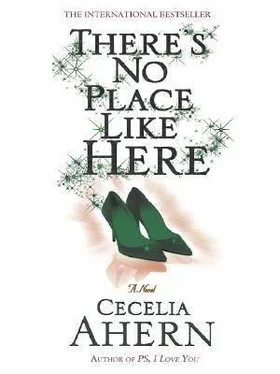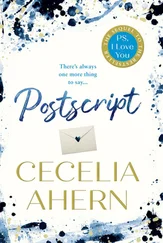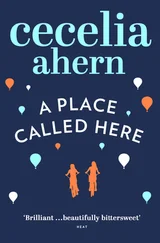He said he didn’t do it. He swore to me he didn’t do it; he kept on repeating that she was his friend and that he couldn’t and wouldn’t hurt her. Nobody believed him; I didn’t believe him; yet we didn’t have the proof of his guilt. We didn’t even have a body. The man became so tormented by his neighbors, by the media, by the constant Garda questioning that he ended his own life, a sure sign to the parents and everybody else of his guilt. But as a nineteen-year-old Robin walked by me and made her way to the counter, I felt ill.
Although Robin had disappeared at the age of six, I knew it was she the moment I lifted my ogling eyes from the Krispy Kreme to see the young woman walk by. A computer-generated image of her had been made public and updated every few years. I had memorized it, had used it every day as part of my mind checks when I came across familiar faces. And that face was all of a sudden coming toward me. The computer image hadn’t been far off, though her face was fuller; her hair was darker; there was a swing in her hips and a knowledge in her eyes as all she had seen and done had altered all but their color. All the things a picture couldn’t convey. But it was she.
I’d been unable to eat my breakfast; instead I sat in a daze at the table with Helena’s family, while Wanda studied me and impersonated my every move. I ignored her and her constant babbling about somebody called Bobby, instead unable to stop myself from watching Robin while trying to figure out how I felt about seeing this young woman living life as she had done for the past twelve years. My feelings were mixed, my happiness bittersweet, because although all the people I yearned to find surrounded me, it was also the moment I realized that I had spent a colossal portion of my life looking in all the wrong places. It’s that moment when you meet your idol, when all your wishes come true; there’s a feeling of secret disappointment.
Helena and I stopped walking at an uncultivated multicolored field filled with bright yellow Bermuda buttercups, blue-and-mauve milkwort, daisies, dandelions, and long grasses, the sweet smell reminding me of the last few breaths I had taken in Glin.
“What’s up ahead?” I spotted more buildings peeking out behind a gathering of silver birch, the oak visible against the peeling, papery black-and-white bark of the trunk.
“That’s another village,” Helena explained. “There are so many new arrivals every day, we couldn’t possibly fit into this tiny town. Also there are so many cultures that wouldn’t and couldn’t settle for living in environments like this. Their homes are out there.” She nodded toward the faraway trees and mountains.
I hadn’t even contemplated that. “So there are more people I’ve searched for, over there?”
“Possibly,” she said in agreement. “They would have registry offices just as we have here so all the names will be logged, although I’m not sure they’ll release the information, as it’s usually deemed private unless in the case of emergencies. Hopefully, we won’t have to go looking for them, they’ll find you.”
I smiled at the irony. “What exactly is this plan you’re hatching?”
“Well,” she said, smiling as her eyes sparkled mischievously, “thanks to the list you provided me with, Joan is now taking bookings for private auditions for a new Irish play in about”-she lifted my hand and looked at my watch-“two hours’ time.”
I felt anxious about meeting people like Robin, but Helena’s plan made me laugh. “Surely there could have been an easier way to do this.”
“Of course,” Helena said, throwing her lemon pashmina over her right shoulder, “but this is so much more fun.”
“What makes you think that any of the people on my list will come to these auditions?”
“Are you joking?” She looked surprised, “Didn’t you see Bernard and Joan? Most people here really love to get involved in activities, especially ones held by people from home.”
“Won’t the non-Irish communities be jealous?” I half-joked. “I wouldn’t want them to think I’m omitting them from my grand production.”
“No.” Helena laughed. “Everyone will have a laugh at our expense come show time.”
“Show time? You mean we’re actually staging a play?” My eyes widened.
“Of course!” Helena laughed again. “We’re not dragging twenty people to the auditions just to tell them there’s no play, but what exactly that play will be we’ve yet to decide.”
My headache returned. “As soon as I start talking to them today they’re going to realize the likelihood of my running an acting agency is no greater than Bernard’s chances of landing a lead role.”
Helena laughed. “Don’t worry, they won’t suspect a thing, and even if they do they won’t mind. People tend to reinvent themselves here; they use this experience as a second chance in life. If what you were at home was not an acting agent, it doesn’t mean that you’re not one here. The longer you’re here the more you’ll notice that there really is a good atmosphere among everyone.”
I had noticed. The atmosphere was relaxed; people were peaceful and went about their daily duties efficiently yet without rushing or panic. There was room to breathe, space to think, time to spend wisely, and lessons to be learned. People who were once lost took time to reflect, to love, to miss, and to remember. Belonging was important, even if it meant joining a hopeless play.
“Won’t Joseph mind that he can’t take part?”
Helena laughed. “Oh, I don’t think that will worry him in the slightest.”
“Joseph is from Kenya?”
“Yes.” We began walking back toward the village. “Along the coast of Watamu.”
“What was it he called me yesterday?”
Helena’s expression changed and I knew she was feigning ignorance. “What do you mean?”
“Come on, Helena, I saw your face when he called me it, you were surprised. I can’t remember the word, kalla…kappa something; what does it mean?”
Her forehead wrinkled in pretend confusion. “Sorry, Sandy, I’ve no idea. I honestly can’t remember.”
I didn’t believe her. “Did you tell him what I do for a living?”
Her face changed to that same intrigued look from yesterday. “He knows now, of course, but he didn’t then.”
“He didn’t when?”
“When he met you.”
“Of course he didn’t, I don’t expect him to be psychic, I just want to know what he said.” I stopped walking out of frustration. “Helena, please be straight with me, I can’t take riddles.”
Her face pinked. “You’ll have to ask him, Sandy, because I don’t know. Whatever it was, it must have been in his local Kiswahili language, and I’m far from being an expert.”
I was convinced she was lying and so we walked in silence. I looked at my watch again, anxious that I would soon be sharing messages from family members at home. Messages they sent off in their prayers every night to land here and be told. I questioned my ability to transmit their sentiments accurately. What I had said to Helena the previous day was true, I wasn’t a people person; finding them didn’t mean wanting to spend time with them. Wondering where Jenny-May went didn’t mean wanting to go there or wishing she’d return.
Helena, as usual, in her own instinctive way picked up on my feelings. “It was nice being able to tell Joseph about my family at long last,” she said gently. “We spoke about them until my lids closed and I dreamed about them until the sun came up. I dreamed about my mother and her organization, about my father and his searching for me.” She closed her eyes. “I woke up in this place this morning hardly knowing where I was after spending hours in my dreams where I grew up.”
Читать дальше












